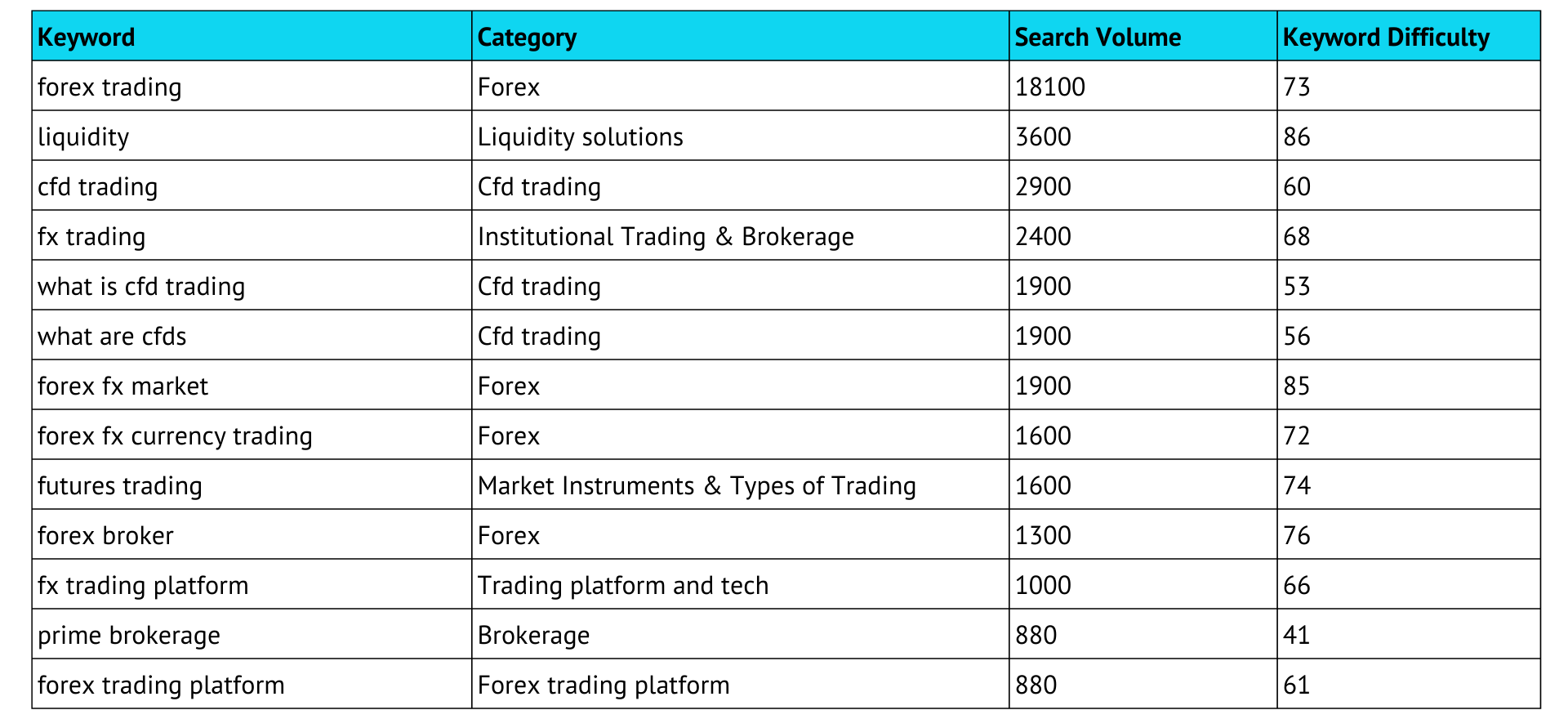Financial Services SEO: Understanding YMYL for Institutional Trading Websites
How SEO can increase inbound leads and support your sales team to win more business

Whether SEO is a primary acquisition channel in your digital strategy or it serves as a supporting tool for your sales team, appearing in search results for key terms beyond your brand name can help you generate more leads and book more meetings.
As a financial service organisation, you will encounter more stringent scrutiny from search engines like Google when trying to appear on search results, and as such it’s essential that every aspect of your site adheres to best practice standards.
Why is SEO important for financial services?
- Builds trust and brand: If you appear on the first pages of Google, it helps to build trust in your brand. This is valid whether you are servicing a retail (D2C) or institutional (B2B) client. A strong SEO strategy helps build and maintain a robust online presence, which is critical for reinforcing your brand’s reputation among institutional clients.
- Reduces reliance on Paid Search: Paid search is a great way to appear on search as you can target a query specifically, however, the moment you turn off your ads, you stop appearing. SEO helps your organic listings, ensuring that you appear on search even when you are not running paid search ads
- Supports PPC performance: SEO improves the way search engines view and understand your page. Consequently it helps achieve better quality scores bringing down how much you pay for a click.
- Supports your ABM strategy: SEO can be aligned with your account-based marketing strategies by targeting specific industries, companies, or roles within organisations. By optimising content for keywords and topics relevant to decision-makers, SEO helps attract the right audience to your site. This article is a perfect example of that.
- Supports long sales cycles: Institutional financial services often involve long sales cycles with multiple stakeholders and a long consideration phase. SEO supports this process by ensuring that your firm remains visible and top-of-mind throughout the research and decision-making process, providing valuable content that guides prospects through the buyer’s journey.
- Lower commission costs for inbound leads: Inbound leads generated through strong SEO efforts often come with lower commission costs compared to outbound or paid acquisition channels.

What do you need to know about SEO for financial services?
Why are financial services websites judged more strictly?
Financial Services websites, whether they are focused on retail or institutional customers, fall under the Your Money Your Life (YMYL) category for Google.
As they can influence important aspects of people’s lives, Google applies stricter criteria for evaluating the quality and trustworthiness of these websites. This makes YMYL SEO particularly challenging but essential for websites in the Financial Services niches.
What is YMYL?
YMYL stands for “Your Money or Your Life,” a term used by Google to categorise content that can significantly impact a person’s financial situation, health, safety, or overall well-being. Examples include medical advice, financial advice, legal information, and news.
When should you include SEO in your marketing strategy?
Due to the complexity and challenges of ranking on search for financial services websites, it is always advisable to include SEO as early as possible. Ideally SEO should be factored in as you are building your website, so you can ensure that all the key functionality has been considered.
The second best time is as soon as possible. SEO takes time to pick up. Google needs to see that the site is worth ranking. So the sooner you start, the sooner you will start seeing results.
Key SEO principles for financial services websites
The below are some of the core areas a financial services website will need to consider. There is more for optimal SEO, but this will provide you with a strong foundation. We are going to cover:
- E-E-A-T - Experience, Expertise, Authoritativeness, Trustworthiness
- High-Quality content and on-page optimisation
- Technical SEO
- Brand
- Compliance
E-E-A-T: Experience, Expertise, Authoritativeness, Trustworthiness for Financial services
- Experience: Refers to the firsthand knowledge and practical involvement an individual or organisation has in the financial sector. Demonstrating experience involves sharing real-world insights, case studies, or personal narratives that highlight a deep understanding of the sector.
- Expertise: Content should be created by individuals or organisations with recognised expertise in the subject matter. For instance, medical articles should be authored or reviewed by certified professionals.
- Authoritativeness: Your site should be a recognised authority in your industry. This can be achieved by accumulating positive reviews, earning high-quality backlinks, and building a strong reputation.
- Trustworthiness: Ensure that your site is secure, transparent, and reliable. This includes using HTTPS, displaying author credentials, and providing clear contact information.
High-quality content and on-page optimisation
- Accuracy and thoroughness: YMYL content must be factually accurate, well-researched, and comprehensive. This means citing reputable sources, updating content regularly, and providing in-depth information that covers all aspects of the topic.
- User intent: Understanding and addressing the specific needs of your audience is paramount. YMYL content should be tailored to effectively solve the user’s query or problem.
- Context matters: Recognising the context in which your audience seeks information allows you to provide more relevant and valuable content. This means considering factors such as the user’s financial goals, risk tolerance, and current market conditions when writing your content.
- Cover the basics: It’s common to see websites attempting to target advanced topics without adequately covering foundational information. Ensuring that your content addresses foundational concepts before delving into complex subjects helps solidify the industry you operate in.
Example keyword research for trading websites
Note this is not an extensive opportunity analysis and is simply to demonstrate a fraction of the traffic that is available.
Table 1: Example of search volume available within these keyword categories. Search volume is the number of monthly searches performed for that keyword.
| Category | Monthly Search Volume | Yearly Search Volume |
|---|---|---|
| Brokerage | 1,480 | 17,760 |
| Cfd trading | 14,920 | 179,040 |
| Financial Information Exchange (FIX) Protocol | 540 | 6,480 |
| Forex | 28,660 | 343,920 |
| Forex trading platform | 5,600 | 67,200 |
| Institutional Trading & Brokerage | 4,270 | 51,240 |
| Liquidity provider | 280 | 3,360 |
| Liquidity solutions | 5,590 | 67,080 |
| Market Instruments & Types of Trading | 4,490 | 53,880 |
| Trading Accounts & Business Services | 1,190 | 14,280 |
| Trading gold and metal | 15,070 | 180,840 |
| Trading Lifecycle & Processes | 1,410 | 16,920 |
| Overall Opportunity | 83,500 | 1,002,000 |
Image 1: Example of some of the keywords (what people type on search) within these above categories.

- Search Volume: The average number of times a specific keyword is searched for in a given timeframe, typically measured monthly.
- Keyword Difficulty: A metric that estimates how challenging it is to rank for a specific keyword in search results, based on factors like competition and domain authority.
Image 2: Graph shows the search volume uncovered in this initial research for each keyword category and the amount of traffic captured by these players for these keywords.

Image 3: % of traffic captured of the overall search volume available. As you can see these players capture low volumes of traffic for the opportunity in this data set.

Note on the data - Data for SV and Website performance has been collected using third party tools.
Technical SEO for financial services websites
Technical SEO refers to how the website is built and ensures that google bots are able to discover, crawl, and index pages on your site. Technical SEO is the foundation upon which you build a house.
Your most important consideration will be getting your site architecture correct. Not only will this be how Google will assess the most important pages on your site, this is also when you will:
- Determine how bots will discover your pages - vital! Especially for important pages on the site, you want to ensure they are no further than 4 clicks from the homepage
- Build the necessary pages to target search terms.
With financial services websites, you want to make sure your technical foundations are spot on. Unlike e-commerce sites, this is probably going to be the easiest part to get right. Where it gets complicated is if you have a multiregional and multilingual website.
A technical audit is the first step. You need to understand what are the strengths and weaknesses of your site. Once you have those, the next step is to create a technical roadmap and prioritise items to be fixed based on impact.
Do you operate globally? SEO can help you reach audiences across different languages and regions
SEO plays a crucial role in helping businesses reach audiences across different languages and regions.
However, implementing international SEO can be tricky. Without proper setup, it’s common for the wrong pages to appear in the wrong locations, leading to confusion for both users and search engines. In some cases, we’ve even encountered websites configured in ways that block search engines from discovering their pages altogether—making it impossible to rank on Google.
Additionally, we often see websites specifying a language and country (e.g., en-US) in their settings, even when their goal is to reach a broader, global audience. While this is useful for targeting specific regions, it can limit your visibility in other English-speaking countries (e.g., en-GB, en-CA). If your aim is to attract a worldwide audience, careful planning of language and regional targeting is essential.
The interplay between SEO and brand building
It’s a common misconception that marketing channels operate independently of one another, but in reality, they are deeply interconnected. Each channel not only supports but also amplifies the effectiveness of others. For example, SEO plays a crucial role in enhancing brand visibility and credibility, which in turn can lead to better PPC performance. Similarly, building a strong brand can significantly boost your SEO efforts.
Google inherently trusts established brands. The more PR coverage, social media mentions, and overall online presence your brand garners, the more Google will perceive it as a credible and authoritative entity. This trust factor is vital; Google is more likely to rank pages from a recognised and reputable brand than from an unknown source.
Therefore, by investing in brand building, you are simultaneously strengthening your SEO foundation, leading to improved search rankings and greater visibility.
How to get buy in for SEO in financial services
Emphasise ROI and long-term value:
Explain how SEO provides long-term value and consistent visibility in a way that complements and reduces reliance on channels like paid search. As such reducing overall customer acquisition costs (CAC).
For example - “SEO lowers our acquisition costs by capturing a steady flow of organic leads. Right now, we’re relying heavily on paid search to reach institutional prospects, which gives quick results but adds up significantly over time. With SEO, we could shift some of our budget from paid search by capturing consistent traffic on organic search for industry-relevant terms like ‘institutional forex trading platform’ and ‘prime brokerage”.
Highlight the competitive edge
Discuss the importance of SEO in capturing market share for key industry terms, especially in YMYL (Your Money or Your Life) sectors, where authority and trustworthiness are paramount. Mention competitors who perform well in search and show where your brand is losing visibility to them, emphasising how a strong SEO strategy can close that gap.
For example: “Competitors like IG Group and Saxo Bank are capturing top positions on Google for important terms related to institutional trading, such as ‘forex trading platforms for institutions’ and ‘options trading platform UK.’ A strong SEO strategy would allow us to compete for this visibility, as potential clients are likely researching platforms at the top of search results. Working on SEO would ensure we’re not losing opportunities to competitors just because they rank higher organically.”
SEO builds brand trust and credibility
Visibility in organic search can help establish your institution as a credible, reliable source of information, supporting broader business goals.
For example, “In institutional finance, trust is paramount. Ranking organically for high-stakes keywords, like ‘institutional trading platforms,’ signals to clients that CMC Markets is an authoritative, trusted player in the industry. This visibility enhances our credibility. A robust SEO strategy would reinforce our brand’s reliability, putting us on par with leading competitors that currently dominate these terms.”
Showcase SEO as a foundation for future growth:
Present SEO as an investment that supports scalability. As your business expands or introduces new services, SEO helps establish visibility without significantly increasing spend. SEO investments in foundational elements like technical infrastructure, quality content, and link-building continue to pay dividends, providing ongoing support for new initiatives.
Emphasise the risk of ignoring SEO
Highlight the risks of neglecting SEO, such as increased reliance on paid channels, potential loss of market share, and reduced online visibility.
For example - “If we don’t invest in SEO, we risk losing organic visibility, increasing our reliance on paid search, and ultimately losing leads to competitors who are visible in organic search. This is especially risky in YMYL sectors like ours, where credibility and ranking can directly impact lead generation.
Conduct a Demand Mining and Gap Analysis
Uncover search opportunity available for your offerings. Essentially understand how many searches people are performing for your services. Once you have that data, run a gap analysis to show where your company appears on search compared to competitors. Explain how an improved SEO strategy can increase rankings for these terms, driving more relevant traffic and ultimately creating opportunities for lead generation and sales.
For example, initial research suggests that there are over 83K monthly searches for services institutional trading platforms offer. That's over 1M searches per year.
Present a clear SEO roadmap with milestones:
Create a phased SEO roadmap, showing initial low-hanging fruit and foundational improvements in the first phase. Set realistic timelines and measurable KPIs, such as improvements in organic traffic to the site, visibility on search, and lead volume.

